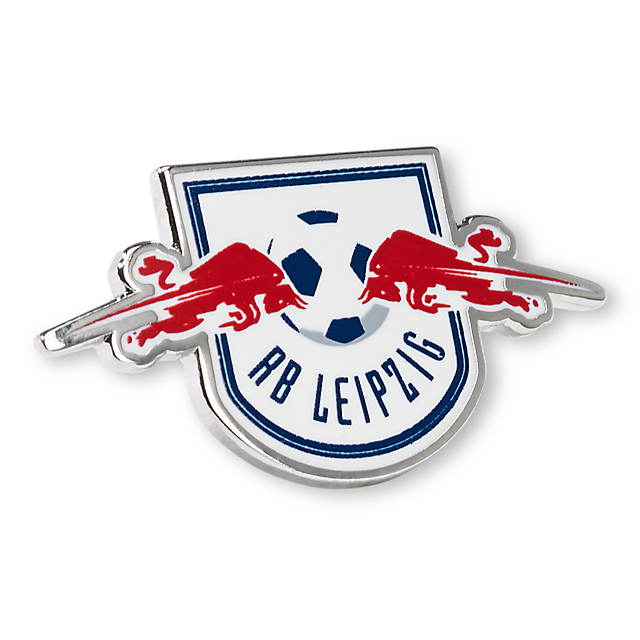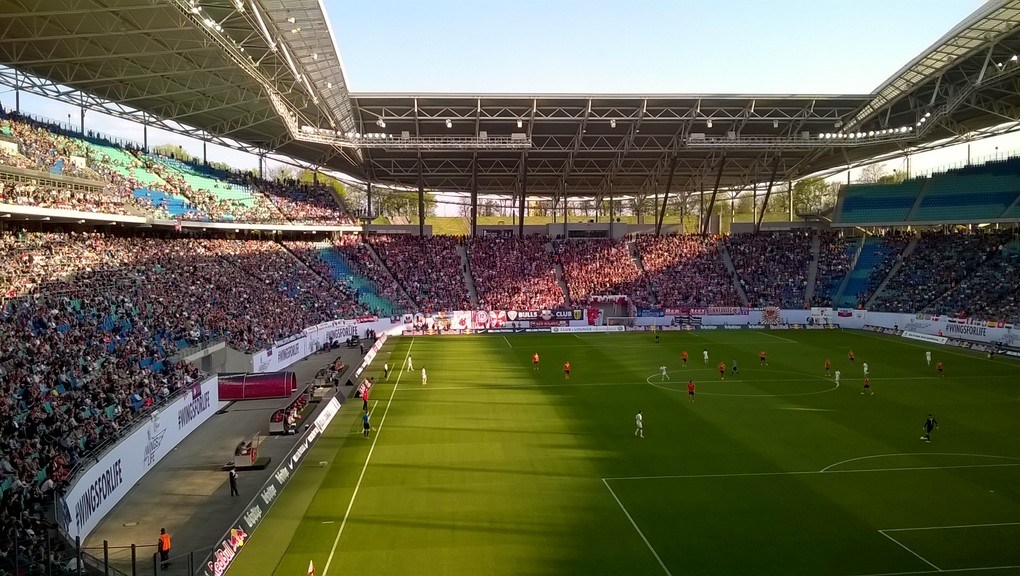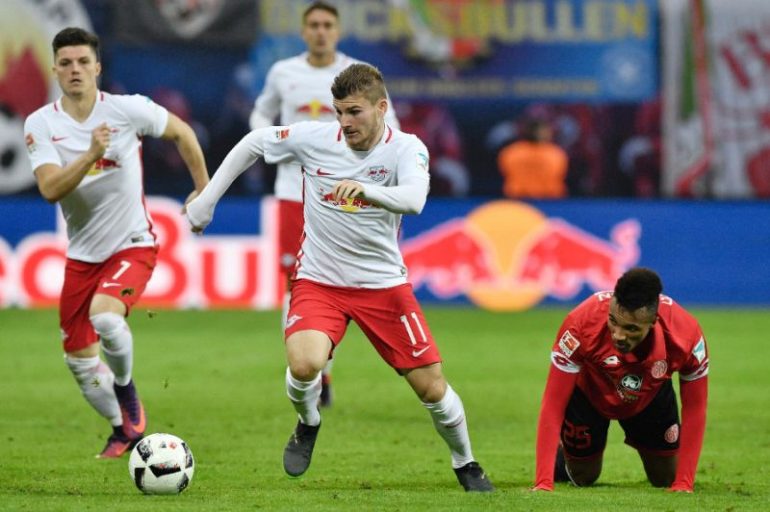The Real Story of RasenBallsport Leipzig (RB Leipzig)


RasenBallsport Leipzig e.V., commonly known as RB Leipzig, is a German association football club based in Leipzig, Saxony. The club was founded in 2009 by initiative of energy drink-maker Red Bull GmbH who purchased the playing rights of the fifth division side SSV Markranstädt with the intention of advancing the new club to the top-flight Bundesliga within eight years. Men's professional football is run by the spin-off organization RasenballSport Leipzig GmbH. RB Leipzig plays its home matches at the Red Bull Arena.
In its inaugural season in 2009–10, RB Leipzig dominated the NOFV-Oberliga Süd (V) and was promoted as champions to the Regionalliga Nord (IV). RB Leipzig won the 2012–13 Regionalliga Nordost season without conceding a single defeat and was promoted to the 3. Liga (III), then finished the 2013–14 3. Liga season as runner-up and was promoted to the 2. Bundesliga (II) as the first team since the introduction of the 3. Liga to win promotion after only one season. On 8 May 2016, Leipzig ensured promotion to the Bundesliga for the 2016–17 season with a 2–0 defeat of Karlsruher SC.
Before investing in Leipzig, Red Bull GmbH, led by co-owner Dietrich Mateschitz, searched three and a half years for a suitable location for an investment in German football.Besides Leipzig, the company also considered a location in West Germany and explored cities such as Hamburg, Munich and Düsseldorf.The company made its first attempt to enter the German football scene in 2006. By advice from Franz Beckenbauer, a personal friend of Dietrich Mateschitz, the company decided to invest in Leipzig.The local football club FC Sachsen Leipzig, successor to the former East German champion BSG Chemie Leipzig, had for years been in financial difficulties.Red Bull GmbH drew up plans to invest up to 50 million Euros in the club.
The company planned a takeover, with a change of team colours and of club name. Involved in the arrangements was film entrepreneur Michael Kölmel, sponsor of FC Sachsen Leipzig and owner of the Zentralstadion. By 2006, FC Sachsen Leipzig played in the Oberliga, by then the fourth tier in the German football league system. Playing in the fourth tier, the club had to undergo the German Football Association (DFB) licensing procedure. Red Bull GmbH and the club were close to a deal, but the plans were vetoed by the DFB, who rejected the proposed new club name and feared too much influence from the company. After months of fan protests, which deteriorated into violence, the company officially abandoned the plans.
In 2007, Red Bull GmbH made plans to invest in Fortuna Düsseldorf, a traditional club with more than 100 years of history. The plans became public, it was known that the company wanted to acquire more than 50 percent of the shares and rumors spread that the company wanted to rename the club "Red Bull Düsseldorf" or similar. The plans were immediately met with wild protests from club supporters. As with FC Sachsen Leipzig, the plans also ran into legal difficulties. The statutes of the DFB did not allow a change of club name for advertising purposes or an external investor to obtain a majority of votes. Eventually, the plans were clearly rejected by club members. The company turned back to East Germany.
A new established club would need teams and a playing right. If it did not acquire a playing right from another club, it would have to start in the Kreisklasse. The company searched for a club playing in the Oberliga,since 2008 the fifth tier in the German football league system and therefore no longer subject to the DFB licensing system. By proposal from Michael Kölmel, the company found SSV Markranstädt, a small club from a village thirteen kilometers west of Leipzig. The club was positive to enter a partnership with a global company. Its Chairman Holger Nussbaum wanted to secure the club's long term finances and designed a plan to engage Red Bull GmbH. Holger Nussbaum presented his plan for Michael Kölmel, who saw his chance and decided to join. Assisted by Michael Kölmel, Red Bull GmbH began negotiations with SSV Markranstädt. Only five weeks after the first contact, SSV Markranstädt had agreed to sell its playing right for the Oberliga to Red Bull GmbH. The cost has not been disclosed, but SSV Markranstädt is believed to have received a compensation of 350,000 euro.
On 2 December 2014, the general meeting of the association voted unanimously for the founding of a spin-off organization in the form of a GmbH. The decision was taken at an extraordinary meeting. Present were 14 voting members and 40 supporting members. Chairman Oliver Mintzlaff stated that the change was made for the club to be able to step up professionally and to remain competitive. The RasenballSport Leipzig GmbH is responsible for the professional team, the reserve team and men's junior teams from U15 and above.
As of 2015, Red Bull GmbH is the main shareholder of RasenballSport Leipzig GmbH, holding 99 percent of the shares. The remaining one percent is held by the association. However, as required by the 50 + 1 rule, formal power lies with the association, holding the majority of votes.As of April 2016, the general manager of RasenballSport Leipzig GmbH is Oliver Mintzlaff.
RB Leipzig's kits have been provided by German sportswear brand Adidas since the club's founding. In 2014, the club switched to the American sportswear brand Nike, in an agreement that will be in place until at least 2025. In October 2014, the club also entered into promotional agreements with Hugo Boss, Porsche as youth sponsor and Volkswagen for stadium commercials. On 20 May 2016, RB Leipzig extended its contract with Krostitzer Brauerei to be its official beer partner until 2018.

RB Leipzig played its inaugural season in 2009–10 at the Stadion am Bad in Markranstädt. The stadium held 5,000 seats and was the traditional home ground of SSV Markranstädt. The plans were however that the first team would quickly move to the far larger Zentralstadion. Hopefully, already in 2010, after a possible advance to the Regionalliga. Red Bull GmbH reserved the naming right to the stadium at the club's founding, meaning that the name could not be sold to anyone else.
The company negotiated the acquisition of the naming right during the successful 2009–10 season and the proposed new name was approved by the City of Leipzig on 25 March 2010. Red Bull GmbH then acquired the naming right and the Zentralstadion was renamed "Red Bull Arena" on 1 July 2010. The contract runs until 2040.The inauguration was held on 24 July 2010, in a friendly match against Schalke 04, in front of 21,566 spectators.
Red Bull Arena had a capacity of 44,345 seats during the 2014–15 season. In March 2015, RB Leipzig announced that it was going to invest 5 million Euros in a redevelopment of the stadium, including an expansion of the VIP area, pressbox and wheelchair spaces. It also included two new larger LED score boards and refurbished player facilities.
The VIP area was expanded from 700 seats to approximately 1400 seats. The capacity of Red Bull Arena was reduced to 42,959 seats before the 2015–16 season, due to redevelopment of various stadium areas.The Red Bull Arena is an all-seated stadium, without standing areas. Home supporters are located in sector B. During the general meeting of the supporters' union in 2014, the assembly made a demand to convert sector B into a standing area. At the time, it was considered impossible to convert sector B into a standing area, for structural reasons.As of 2016, there still has been no response.

In the 2013–14 season, RB Leipzig made its first appearance in the 3. Liga in club history. The club signed Anthony Jung from FSV Frankfurt, Tobias Willers from Sportfreunde Lotte, Joshua Kimmich from the U19 team of VfB Stuttgart, André Luge from FSV Zwickau, Christos Papadimitriou from AEK Athens, Yussuf Poulsen from Lyngby BK and Denis Thomalla from TSG 1899 Hoffenheim during the summer.
RB Leipzig was eliminated by FC Augsburg in the first round of the 2013–14 DFB-Pokal on 2 August 2013 after losing 0–2 at the Red Bull Arena. The defeat brought an end to a year-long series without defeat in competitive matches. The 2013–14 Liga had a more promising start. The team won its first match, against Hallescher FC away, by 1–0 on 19 July 2013 and kept an undefeated streak until 31 August 2013, when the team lost 1–2 to first placed team SV Wehen Wiesbaden away.
On 5 October 2013, RB Leipzig again met the first placed team. SV Wehen Wiesbaden had lost its first-place position to FC Heidenheim only one week after its defeat of RB Leipzig. 1. FC Heidenheim would defend it until the end of the season. RB Leipzig defeated 1. FC Heidenheim by 2–0 after a convincing performance at the Voith-Arena and climbed to third place. During the winter break, players Christos Papadimitriou, Juri Judt, Carsten Kammlott and Bastian Schulz left the team. In return, the team was joined by Diego Demme from SC Paderborn 07, Federico Palacios Martinez from VfL Wolfsburg, Mikko Sumusalo from HJK Helsinki and Georg Teigl from FC Red Bull Salzburg.
After losing 1–2 away to MSV Duisburg on 1 February 2014, the team would not concede a single defeat for the rest of the season. A thrilling duel with SV Darmstadt 98 appeared, with both teams fighting for the crucial second place. The two teams met at the 35th matchday, on 19 April 2014. RB Leipzig came out as the winner, defeating SV Darmstadt 98 by 1–0 in front of 39,147 spectators at the Red Bull Arena.
RB Leipzig secured the second place and direct promotion to the 2. Bundesliga two weeks later, after defeating last placed team 1. FC Saarbrucken 5–1in front of a nearly sold out Red Bull Arena on 3 May 2014. The crowd of 42,713 spectators set a new club record.By finishing the season in second place, RB Leipzig won promotion to the 2. Bundesliga and became the first team since the introduction of the 3. Liga to win promotion to the 2. Bundesliga after only one season.
RB Leipzig remained undefeated in the first thirteen league matches of the 2016–17 season, breaking a record for the longest undefeated streak of a promoted team to the Bundesliga. The team finished the 11th matchday on first place, and became the first team from the New states of Germany to hold the leading position since the 1991–92 Bundesliga season, when Hansa Rostock stood at first place on 31 August 1991. They held the position for three matchdays, relinquishing it after a loss against FC Ingolstadt.
season 2014–15Following promotion to the 2. Bundesliga, the organization responsible for licensing was no longer the DFB, but instead the German Football League (DFL). The DFL announced its first decision in the licensing process on 22 April 2014. RB Leipzig was to be given a license for the 2014–15 2. Bundesliga season, but only under certain conditions. Criticism mounted that the club lacked in participation, that club management was too concentrated in only a handful of people and that the club was not independent enough from Red Bull GmbH. To ensure independence and improve participation, the DFL set up three requirements that the club had to meet in order to obtain a license for the 2014–15 2. Bundesliga season.
One of the requirements was to redesign the crest, as the crest too closely resembled the corporate logo of Red Bull GmbH. A second requirement was to change the composition of the club's organizational bodies. A third requirement was to lower the membership fees and open up the association for new members. The German legal magazine Legal Tribune Online assessed all three requirements set up by the DFL as legally questionable.
RB Leipzig filed an appeal on 30 April 2014. Sporting director Ralf Rangnick appeared in media and expressed his willingness to reach a compromise with the DFL, saying that important is not what is written on the jersey, but what is inside.On 6 February 2015, the club lost 2–0 to Erzgebirge Aue. As consequence, the club had now played four matches without a win and had lost contact with the top placed teams. On the following Tuesday evening, the club summoned Alexander Zorninger to a meeting, and on Tuesday night, the club took the decision to walk separate ways with him after the season.
The decision had been taken by the club management in consultation with Red Bull GmbH owner Dietrich Mateschitz. Already on the next morning, Alexander Zorniger announced his own decision to leave immediately. The club received criticism for its decision.Under Alexander Zorniger, the club had risen from the Regionalliga to the 2. Bundesliga. The decision was considered merciless by some media.Incumbent RB Leipzig U17 coach Achim Beierlorzer was announced as interim head coach for the rest of the season.
On 5 March 2015, RB Leipzig met VfL Wolfsburg in the third round of the 2014–15 DFB Pokal. The club was eliminated after being defeated with 2–0 at the Red Bull Arena. The match was attended by 43,348 spectators. It was the first time in club history that the stadium had been completely sold out.The preferred candidate of sporting director Ralf Ragnick as new head coach from the summer was former Mainz 05 coach Thomas Tuchel, but the negotiations with Thomas Tuchel failed. Another candidate was Bayer Leverkusen junior coach Sascha Lewandowski, but he too declined the offer. In May 2015,sporting director Ralf Ragnick was himself announced as new head coach from the summer, with Achim Beierlorzer as his assistant. Ralf Rangnick was planned to serve this double job for one season.RB Leipzig finished the 2014–15 Bundesliga season in fifth place.
Before the 2015–16 season, RB Leipzig invested further in strengthening the team, signing Davie Selke from Werder Bremen, Atınç Nukan from Beşiktaş, Marcel Halstenberg from FC St. Pauli and Willi Orban from 1. FC Kaiserslautern. Selke was signed for an estimated €8 million, Nukan for an estimated €5 million and Halstenberg for an estimated €3 million. Meanwhile, Joshua Kimmich was sold to Bayern Munich and Rodnei left to join 1860 Munich as free agent.
RB Leipzig also made transfers with its unofficial sister club, the FC Red Bull Salzburg. As several times in the past, three players were signed on free transfer, among them the Austrian national Stefan Ilsanker. They were joined by Massimo Bruno and Marcel Sabitzer, returning to RB Leipzig from being on loan. These transfers provoked anger among the fans of FC Red Bull Salzburg. For several years had FC Red Bull Salzburg transferred some of its best players to RB Leipzig.
Fans of FC Red Bull Salzburg were heard singing chants against RB Leipzig during a game in the ÖFB-Cup in April 2015, after Austrian media had reported that Stefan Ilsanker could move to Leipzig during the summer. The signing of Davie Selke was record breaking, being the most expensive player ever signed in the history of the 2. Bundesliga. In total, the club spent a sum of approximately €18.6 million on new players during the summer of 2015, more than all other clubs in the 2. Bundesliga together.
During the pre-season 2014–15, RB Leipzig defeated Southampton with 5–4 in Bischofshofen on 8 July 2015, and Rubin Kazan with 1–0 in Leogang on 12 July 2015. The team then went on to defeat Hapoel Tel Aviv with 3–0 at the Red Bull Arena on 18 July 2015. RB Leipzig made only few transfers during the winter break. Defender Tim Sebastian, who had been in the team since 2010 and who had once served as captain, left to join SC Paderborn, and midfielder Zsolt Kalmár left to join FSV Frankfurt on loan.
RB Leipzig held the leading position in the league until the 27th matchday, when it was again lost to SC Freiburg, after the team suffered a 3–1 defeat away against 1. FC Nürnberg on 20 March 2016. The team now stood at second place in the league, only three points ahead of 1. FC Nürnberg on third place.RB Leipzig then recorded two straight wins and expanded the distance to six points.But with only three matches left of the league season, the distance had shrunk to four points.
RB Leipzig finally secured a second place in the league and direct promotion to the Bundesliga at the 33rd matchday, after defeating Karlsruher SC by 2–0 in front of 42,559 spectators at the Red Bull Arena on 8 May 2016. The promotion was celebrated together with 20,000 supporters at the Market Square in front of the Old Town Hall in central Leipzig on 16 May 2016. The team was received before the celebration by Leipzig Mayor Burkhard Jung.
At the end of the season, Ralf Rangnick was to resign as head coach, in order to be able to focus on his job as sporting director. German media had during the season speculated in several potential candidates for new head coach, including Markus Gisdol, Sandro Schwarz, Jocelyn Gourvennec, René Weiler, and notably Markus Weinzierl. On 6 May 2016, Ralph Hasenhüttl was announced as new head coach. Ralph Hasenhüttl had successfully served as head coach of FC Ingolstadt 04 since October 2013, having brought the team from the bottom of the 2. Bundesliga to the Bundesliga, and also managed to defend the spot in top tier during the 2015–16 season.
Credits: wikipedia.org
Timo Werner scores for RB Leipzig | 2016-17 Bundesliga Highlights